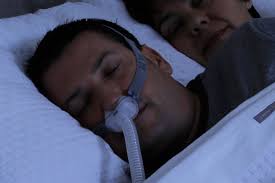In recent years, sleep has taken center stage as a pillar of overall health, right alongside diet and exercise. Increasingly, experts are emphasizing that poor sleep isn’t just an inconvenience—it’s a major health risk. One of the most overlooked yet serious sleep disorders is sleep apnea, a condition that disrupts breathing during sleep and contributes to chronic diseases such as hypertension, diabetes, depression, obesity, and even cardiovascular disease.
In honor of Sleep Awareness Week, Dr. Brian J. Walsh, a board-certified pulmonologist and medical director of the Bayhealth Sleep Center in Smyrna, is helping to dispel some of the most persistent myths about sleep apnea. From mistaken assumptions about who gets it to the myth of quick-fix treatments, it’s time to set the record straight.

What Is Sleep Apnea?
Sleep apnea is a disorder in which breathing repeatedly stops and starts during sleep. The most common form, obstructive sleep apnea (OSA), occurs when the muscles in the throat relax excessively, blocking airflow. Central sleep apnea, a less common type, involves the brain failing to signal the muscles to breathe.
Left untreated, sleep apnea can significantly impair daytime function and increase the risk of severe medical conditions. But unfortunately, many people are unaware they even have it—or believe in outdated or inaccurate information.
Myth #1: “I Sleep Fine—So I Must Not Have Sleep Apnea”
The Truth: Sleep Apnea Often Goes Unnoticed
One of the biggest myths surrounding sleep apnea is that you’ll know if you have it. In reality, most individuals with sleep apnea are unaware of their disrupted sleep because the awakenings are often subtle and not fully conscious.
Signs you may have sleep apnea without realizing it:
-
Morning headaches
-
Dry mouth upon waking
-
Excessive daytime sleepiness
-
Irritability or mood swings
-
Difficulty concentrating
If your partner reports loud snoring or you wake up feeling unrefreshed, it may be time to undergo a sleep study.
Myth #2: “Only Overweight People Get Sleep Apnea”
The Truth: Sleep Apnea Affects All Body Types
While being overweight does increase the risk of developing sleep apnea, it’s not exclusive to individuals with higher body mass index (BMI).
Factors other than weight that contribute to sleep apnea:
-
Genetics – A family history increases your risk.
-
Neck circumference – A thicker neck can narrow the airway.
-
Nasal congestion – Chronic allergies can contribute to breathing issues.
-
Anatomy – Enlarged tonsils, a small jaw, or a recessed chin can obstruct airflow.
Sleep apnea should be considered for anyone with symptoms, regardless of size or age—even children can be affected.
Myth #3: “There Are Quick Fixes for Sleep Apnea”
The Truth: Treatment Is Long-Term and Requires Consistency
Sleep apnea isn’t a condition with a one-time solution or a temporary fix. Long-term management is essential to controlling symptoms and minimizing health risks.
Effective long-term treatments include:
-
CPAP (Continuous Positive Airway Pressure) – Keeps airways open with gentle pressure.
-
Oral appliances – Devices fitted by a dentist to reposition the jaw.
-
Lifestyle changes – Weight loss, quitting alcohol and smoking, sleeping on your side.
-
Surgery – In select cases, procedures like UPPP or Inspire therapy may be considered.
Why Sleep Matters: More Than Just Rest
Sleep is a biological necessity that plays a vital role in cognitive function, memory consolidation, hormone regulation, and immune health.
The Effects of Poor Sleep:
-
Impaired decision-making
-
Weakened immune system
-
Increased inflammation
-
Elevated risk of chronic disease
Sleep and Weight Gain
Lack of sleep also alters hunger hormones like ghrelin and leptin, leading to increased appetite and cravings—especially for high-calorie, sugary foods. This creates a vicious cycle: weight gain worsens sleep apnea, and untreated sleep apnea promotes further weight gain.
Frequently Asked Questions:
Q1: Can I have sleep apnea even if I don’t snore?
Yes, while snoring is a common symptom, some people with sleep apnea may not snore at all. Other symptoms like daytime fatigue are also indicators.
Q2: Is CPAP therapy the only treatment option?
No, although CPAP is the most effective treatment, alternatives like oral appliances or surgery may be appropriate depending on the severity and cause.
Q3: Can sleep apnea go away if I lose weight?
Possibly. Significant weight loss can reduce the severity of symptoms, but it doesn’t always eliminate the need for treatment. A sleep study is still necessary.
Q4: Can children have sleep apnea?
Yes, especially if they have enlarged tonsils or adenoids. Pediatric sleep apnea can affect development, behavior, and school performance.
Q5: How much sleep do I really need each night?
Most adults need 7 to 8 hours of quality sleep per night. Consistently getting less than this can negatively impact your health and worsen sleep apnea.




